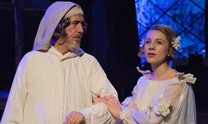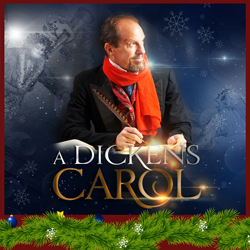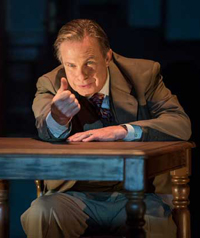
Playgoers enamored of traditional interpretations, whether for the purpose of introducing new generations thereto or perhaps expanding their own cultural parameters, can yearly look to the Goodman Theatre for Victorian misers, selfless families and mentorly ghosts, or to American Blues Theater for a hero's crisis of faith recounted as an early 20th-century live-action radio broadcast. Those seeking something new, however, can choose among a variety of innovative re-imaginings, both big and small.
 This Yuletide, Oak Park Festival Theatre's A Dickens Carol shows us Charles Dickens forced to review the events of his life during a brush with death, while Citadel Theatre Company's musical Scrooge and the Ghostly Spirits introduces us to a group of traveling actors bringing their spectral saga to London, and American Blues Theater's This Wonderful Life condenses the cinematic favorite to a single voice for a solo show starring Jim Leaming.
This Yuletide, Oak Park Festival Theatre's A Dickens Carol shows us Charles Dickens forced to review the events of his life during a brush with death, while Citadel Theatre Company's musical Scrooge and the Ghostly Spirits introduces us to a group of traveling actors bringing their spectral saga to London, and American Blues Theater's This Wonderful Life condenses the cinematic favorite to a single voice for a solo show starring Jim Leaming.However different their approaches, the springboard for all three narratives are the fundamental questions of a) why tell this story? b) why tell this story? and c) why tell this story now?
"The lesson of A Christmas Carol is that it's never too late for redemption," says Kevin Theis, who takes on the title role in Ned Crowley's Dickens Carol. "Look at Scrooge! What's the point of reforming him? Why should Marley and all the other spirits bother trying to save him, when they could instead wait for his inevitable death and then just move on? The answer is that nobody—however old, bitter, stubborn or avaricious they may be—is beyond salvation."
Douglas Post, the author, composer and lyricist of Scrooge and the Ghostly Spirits, discovered his inspiration in Dickens' social message, "What found form as a song in my mind after reading the novella was Marley's declaration 'Mankind was my business!' In that moment, with those words, I knew the show had to be written, that it had to be musical and that more songs would come."
 None of these themes are exclusive to Christianity—This Wonderful Life's setting in upstate New York never specifies its hero's religious affiliations, nor do we ever hear the name of the church from which Bob Cratchit returns home carrying Tiny Tim on his shoulder.
None of these themes are exclusive to Christianity—This Wonderful Life's setting in upstate New York never specifies its hero's religious affiliations, nor do we ever hear the name of the church from which Bob Cratchit returns home carrying Tiny Tim on his shoulder."This is a very personal lesson in how precious each life is, and how, in our darkest moments, our community will be there for us." says Carmen Roman, director of This Wonderful Life. Post concurs "Any one of us could be Scrooge."
"If ever there was a time when we needed to be reminded that mercy, charity, compassion and generosity of spirit should be our primary mission on this earth, it is now," Theis insists, "Dark times call for light, and good deeds—as Mister Shakespeare reminded us—are what shine most brightly in a weary world."
A Dickens Carol opens at the Madison Street Theatre in Oak Park on November 25 and runs through December 24
Scrooge and the Ghostly Spirits runs at the West Campus Theatre in Lake Forest through December 23
This Wonderful Life runs at the Edge Theater through November 26
Mary Shen Barnidge
Contributing Writer
